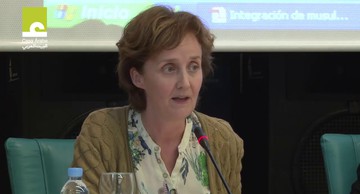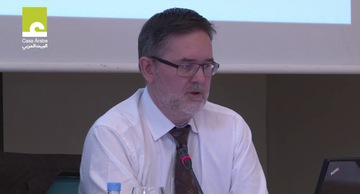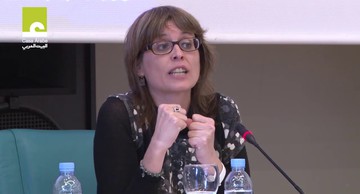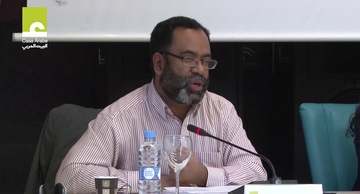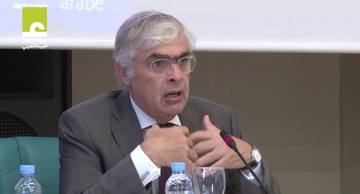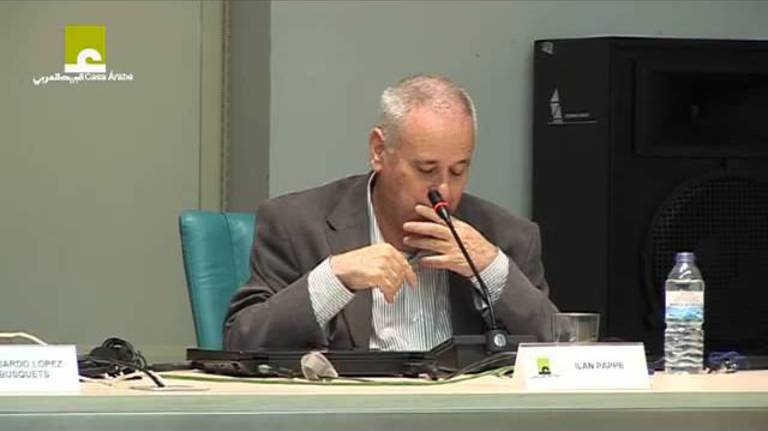

Conference by Ilan Pappé: The Semblance of Peace in Palestine
Published at 39 12,,, 14 2014
ALL VIDEOS IN THIS CATEGORY
-
Seminar "Integration of Muslims in Europe". Session 4 (5/5)
Casa Árabe and the Konrad Adenauer Foundation organized this seminar for November 17, 2017 at which the institutional frameworks and practical experiences of different countries on the continent were analyzed. SESSION 4. Perception and portrayal of European Muslims. Stefano Allievi, International Forum for Democracy & Religions Virtudes Téllez, Study Group on Arab and Muslim Societies (GRESAM) Moderated by: Ana I. Planet, Universidad Autónoma de Madrid-UAM More info: http://en.casaarabe.es/event/integration-of-muslims-in-europePublished at 07 12,,, 17 2017 -
Seminar "Integration of Muslims in Europe". Session 3 (4/5)
Casa Árabe and the Konrad Adenauer Foundation organized this seminar for November 17, 2017 at which the institutional frameworks and practical experiences of different countries on the continent were analyzed. SESSION 3. Models and practical experiences for integration. Jonas Alwall, University of Malmö Corinne Torrekens, Université Libre de Bruxelles Jordi Moreras, Universitat Rovira i Virgili Moderated by: Karim Hauser, Casa Árabe More info: http://en.casaarabe.es/event/integration-of-muslims-in-europePublished at 05 12,,, 17 2017 -
Seminar "Integration of Muslims in Europe". Session 2 (3/5)
Casa Árabe and the Konrad Adenauer Foundation organized this seminar for November 17, 2017 at which the institutional frameworks and practical experiences of different countries on the continent were analyzed. SESSION 2. Adapting to new challenges. Vit Novotny, Martens Centre Gemma Pinyol Jiménez, Universidad Pompeu Fabra Sol Tarrés, University of Huelva Moderated by: Puerto García, Fundación Pluralismo y Convivencia More info: http://en.casaarabe.es/event/integration-of-muslims-in-europePublished at 02 12,,, 17 2017 -
Seminar "Integration of Muslims in Europe". Session 1 (2/5)
Casa Árabe and the Konrad Adenauer Foundation organized this seminar for November 17, 2017 at which the institutional frameworks and practical experiences of different countries on the continent were analyzed. SESSION 1. European legal frameworks in the field of migration. Mohammed Aziz, Director of the Aziz Foundation and a Fellow of Faiths and Civil Society Unit, Goldsmiths, University of London Stephan Hinghofer-Szalkay, University of Graz Ángeles Solanes Corella, University of Valencia Moderated by: Héctor Cebolla, UNED More info: http://en.casaarabe.es/event/integration-of-muslims-in-europePublished at 00 12,,, 17 2017 -
Seminar "Integration of Muslims in Europe". Opening (1/5)
Casa Árabe and the Konrad Adenauer Foundation organized this seminar for November 17, 2017 at which the institutional frameworks and practical experiences of different countries on the continent were analyzed. The continent of Europe has experienced a series of migratory waves in the twentieth century which have redefined its demographic, ethnic and religious makeup. At the same time, the transformation of the EEC into the EU and its later expansion have allowed for unprecedented movement by people. Though the diversity of today’s Europeans is enormous, it is of interest to take a closer look at the case of communities originating from countries with a Muslim majority. It was estimated in the year of 2010 that the European Union was home to approximately 13 million Muslim immigrants. The history of the EU’s members as societies taking in refugees varies greatly and includes many nuances. In France, the Muslims of a foreign origin come mostly from its former French colonies of Algeria, Morocco and Tunisia. Similarly, in the United Kingdom, the mark left behind by colonialism has meant a greater presence of Muslims from the Indian subcontinent and from Africa. In contrast, Germany’s Muslims consist mainly of Turkish immigrants and their descendants, though they also include many who were born in Kosovo, Iraq, Bosnia-Herzegovina and Morocco. In Spain, immigration has developed along with the economic, social and demographic changes which the country has undergone in just a short period of time, especially after the processes of democratization and the country’s later membership in the EEC in 1986. Added to all of this has been the recent influx of refugees, mainly from Syria, Afghanistan and West Africa. The contact which has been produced with such diversity has modified certain institutional and social parameters, while at the same time contributing organizational community structures. In the words of Oliver Roy, the Law ends up constructing a “legal form of the religious,” without going so far as defining it based on its content. As for the Islamic religion and its registered institutions, they have assumed this discourse in the sense that they feel legitimized by their legal status, while at the same time claiming their place within the public space. Understanding the way in which regulatory frameworks have been defined to produce greater or lesser inclusiveness of Arabs and Muslims in European societies is essential in today’s context of major migratory pressure and increasing Islamophobia. At the same time, it is advisable to analyze, beyond just the legal context, the successful experiences in the field of integration so as to identify good practices and create recommendations for the future. In summary, the seminar organized by Casa Árabe and the Konrad Adenauer Foundation proposes an analysis of different European legal systems, as well as sharing local experiences and practices. Each session will seek to complete comparative analyses of several countries in the EU, with both European and Spanish speakers. The goal is to spur debate, provide information and potentially influence the formulation of public policies. Opening session. Migration and diversity management. Institutional presentations: José Antonio Nieto Ballesteros, State Secretary of the Interior. Regina Jordan, Director of Integration and Social Cohesion, Germany’s Federal Office for Migration and Refugees (pending confirmation) Wilhelm Hofmeister, director of the Office for Spain and Portugal, Konrad Adenauer Foundation Pedro Martínez-Avial, General Director, Casa Árabe Presentation: Anna Terrón, Instrategies More info: http://en.casaarabe.es/event/integration-of-muslims-in-europePublished at 57 12,,, 17 2017

